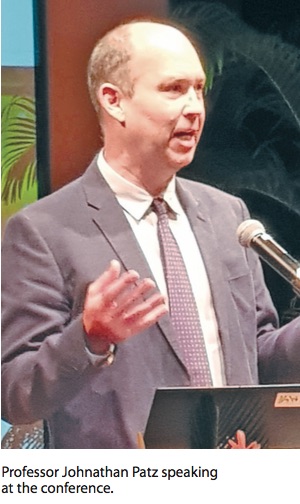Medical Sciences conference shows the clear link between the planet’s health and our survival
Planetary health needs to be on the agenda of every single human being if we intend to survive as a species.

The startling premonition came from Dr Sandeep Maharaj, Associate Dean of Distance Education, Projects and Planning at UWI’s Faculty of Medical Sciences (FMS) and Global Outreach Fellow at the Planetary Health Alliance (PHA).
The professor’s remarks stemmed from a recent Caribbean Planetary Health Conference facilitated by the University of the West Indies’ Entrepreneurship and Business Transformation Office at FMS which he helped to coordinate. Themed “Building Resilient Health Systems for Climate Change in the Caribbean”, the conference took place on January 19 at UWI’s Learning Resource.
A statement from the Rockefeller Centre Foundation- Lancet Commission on Planetary Health, defines planetary health as the recognition that “human health and the health of our planet are inextricably linked and that our civilization depends on human health, flourishing natural systems, and the wise stewardship of natural resources. With natural systems being degraded to an extent unprecedented in human history, both our health and that of our planet are in peril.”
Human beings utilise approximately half of Earth’s livable surface in order to feed ourselves. It is estimated that one to two million hectares of tropical forest are being lost to urbanisation and food production per annum. This has led to increased carbon dioxide emissions, substantial loss to biodiversity and the spread of new infectious diseases.
With the planet’s population expected to expand to 10 Billion by 2050 due to public health advancements that have increased individual longevity and reduced infant mortality, Dr Maharaj asserted that everyone needed to wake up to a reality that it cannot be business as usual.
“We create sustainability models for the (public) health care system but if we cannot create a sustainable model generally for mankind it makes no sense having a sustainable health care model,” contended the Professor.
Close to home, he cited the devastating impact Hurricane Dorian had on human life in the Bahamas in 2019, declaring that the planet is no longer experiencing “global warming” but “global weirding”. He said Trinidad and Tobago is a classic example of this condition as we continue to experience massive amounts of flooding in tandem with water shortages.
“The reality is if you expect to have a better life for future generations to come, planetary health must be focussed on as a priority,” said Dr Maharaj.
Regionally, he said Caribbean governments needed to place immediate emphasis on creating policies that would establish green cities, ban Styrofoam, reduce plastics, create bicycle communities, encourage carpooling, foster more sustainable technology-driven agricultural practices, promote the development of energy efficient architecture, and, particularly in Trinidad and Tobago, kick-start an aggressive reforestation programme.
Professing that all was not lost, Dr Maharaj stated, “Yes, we are hearing a scary story here, but there are many, many solutions available to deal with it. Yes, humans are creating problems for the environment, but the environment can also supply some solutions to these problems”.
Speakers at the Caribbean Planetary Health Conference included local and international experts such as Professor Jonathan Patz of the University of Wisconsin-Madison; Professor Samuel Myers of the Harvard University Centre for the Environment and Director of the Planetary Health Alliance; Dr Maida Galvez of the Icahn School of Medicine at Mount Sinai; and Dr Erica Wheeler and Dr Jonathan Drewry of the Pan American Health Organisation. Speaking on behalf of UWI at the conference were Dean of FMS Professor Terence Seemungal, Professor of Veterinary Virology Christopher Oura, and Senior Lecturer in the Department of Life Sciences Dr Adesh Ramsubhag.
UWI is a participating member of the Planetary Health Alliance, which was launched in 2016 with the support of the Rockefeller Foundation. The Alliance is a consortium of over 200 universities, non-governmental organisations, research institutes and government entities from around the world committed to understanding and addressing global environmental change and its health impacts.